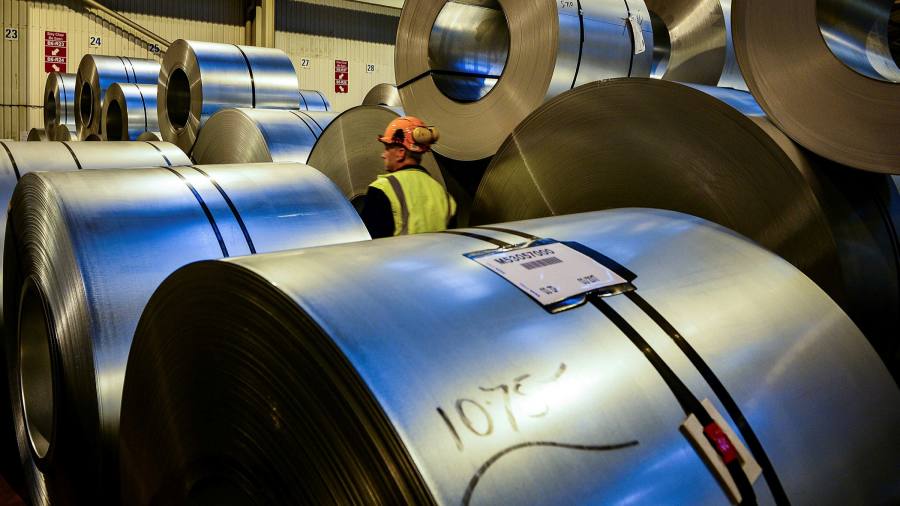The US is delaying a deal to remove Trump-era tariffs on UK steel and aluminium because of Washington’s concerns about London’s threats to change post-Brexit trading rules in Northern Ireland.
Brussels and Washington have repeatedly warned London that unilaterally changing the EU-UK accord that sealed Britain’s exit from the bloc in 2020 could threaten peace on the island of Ireland.
In a communication seen by the Financial Times, a US commerce department official stated that talks with the UK on easing metals tariffs could not move ahead.
The official cited US concerns at British threats to trigger Article 16, a safeguard clause in the post-Brexit Northern Ireland protocol that overrides part of the UK’s exit with the EU and would suspend checks on goods travelling to Northern Ireland from the rest of the UK.
Washington had informed the UK of the reason for the hold-up, the communication said. Three people familiar with the matter also said talks were stuck after pressure from Congress over the UK’s threats to trigger the clause.
Boris Johnson’s government has said it will invoke Article 16 if a deal is not struck with Brussels to ease what it says are unworkable restrictions on trade between Great Britain and Northern Ireland imposed by the protocol. Despite recent signs that the UK has softened its stance, Downing Street insists that the option remains on the table.
The EU and US agreed to suspend tariffs on billions of dollars of steel and aluminium in October.
The deal provides relief from Trump-era tariffs of 25 per cent on steel and 10 per cent on aluminium to European manufacturers, but leaves UK steelmakers at a disadvantage because they still face steep duties on exports to the US. UK retaliatory duties on US bourbon whiskey and other products have also remained in place.
Martha Dalton, a whiskey importer in the UK who co-founded the Bourbon Alliance to represent the industry, said that alliance members were “deeply concerned by the lack of movement on the . . . negotiations”. “We were optimistic that the brokering of a deal between the US and EU would lead the way for some positive news for our UK-based members,” she added.
Under the Brexit deal, Northern Ireland remained in the EU single market for goods to prevent a trade border on the island of Ireland. Instead, all goods travelling from Great Britain into Northern Ireland must conform to EU rules, which means increased paperwork and delays in shipments.
The EU has suggested easing controls but London says the proposals do not go far enough and has instead threatened to trigger Article 16. The clause can be invoked by the UK or EU if either side believes the arrangement has caused “serious economic, societal or environmental difficulties” or the “diversion of trade”.
The issue has attracted the attention of a substantial Irish diaspora in the US Congress, which has repeatedly called on the UK to honour the 1998 Good Friday Agreement that ended the region’s three-decade long conflict. In November, senior Democratic legislators publicly warned that by threatening to trigger Article 16, the UK threatened to destabilise trade relationships and “hard-earned peace”.
Joe Biden, US president, told Johnson as recently as September not to allow the post-Brexit dispute with Europe to destabilise peace on the island of Ireland.
The National Security Council at the White House insisted that there was “no link” between the talks and the UK’s position on the Northern Ireland protocol.
The commerce department declined to comment on the communication seen by the FT. It referred to an earlier statement saying that the US and UK were “consulting closely on bilateral and multilateral issues related to steel and aluminium”.
The US trade representative’s office said that talks with the UK were ongoing.
The UK department of trade said: “We do not see any connection with this particular issue and the Northern Ireland protocol and it will in no way affect the UK’s approach. That is because significant changes are needed to the protocol in order to protect the Belfast (Good Friday) agreement and Northern Ireland’s place in the UK internal market.”
It added that the department had “regular discussions with both US trade representative Katherine Tai and commerce secretary Gina Raimondo on the issue” and remained “focused on agreeing a resolution that sees damaging tariffs removed”.
